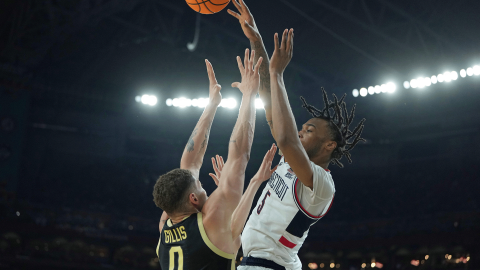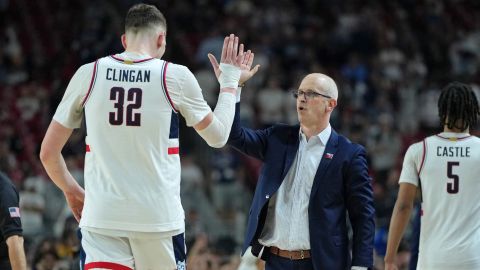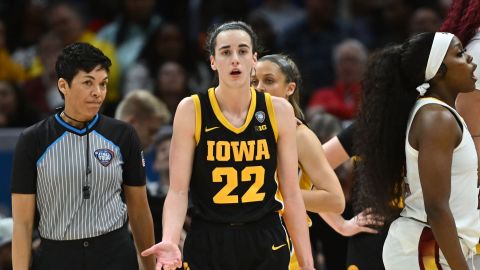 Sean Miller said the magic words.
Sean Miller said the magic words.
Those magic words are, apparently, “he touched the ball,” a phrase loaded with sarcasm and innuendo. Only, it isn’t.
Miller, the coach of Arizona’s men’s basketball team, repeated that innocent message to the officials several times late in the second half of the Pac-12 semifinals on Friday. Those four words earned Miller a technical foul and gave UCLA the game-tying free throw attempt, which later turned out to be crucial in the Wildcats’ two-point loss.
With that, college basketball’s much-hyped “championship week” suffered another officiating embarrassment by a referee who did not like the taste of his humble pie. For the second straight day, an official issued a technical to cover up a ludicrous call at a critical juncture in a conference tournament game, reminding us that in the pressure of the postseason, coaches and players are not the only people involved who must keep their emotions in check. Officials need to, as well.
Before Miller’s brush with the zebra-striped law — which he amusingly relived multiple times in the postgame news conference, as you can watch below — the biggest officiating-related controversy of the week involved Richmond coach Chris Mooney and his aggrieved Spiders. If you did not see the end of Richmond’s loss in the opening round of the Atlantic 10 Tournament on Thursday, all you need to know is that Richmond received three technical fouls in the final 4.2 seconds of the game, and Charlotte’s Pierria Henry scored the last eight points, all from the free throw line.
But, in case you are curious, we will give you the details anyway, as best we can.
Richmond led by three points when Mooney, wisely, had his players foul to give Charlotte two foul shots rather than allow a potential game-tying 3-pointer. As Henry’s first free throw went through the net, Richmond’s Derrick Williams and Charlotte’s Willie Clayton got entangled, with Williams shoving Clayton to the ground. Williams received a technical foul, although replays showed Clayton was at least as guilty for swiping at the top of Williams’ head, for some reason.
Because Williams’ technical came during a dead ball, the officials awarded Henry two extra foul shots — in addition to his second free throw for the initial foul — plus possession of the ball. With Richmond now trailing by one point, Mooney again, rightly, called for his team to foul, stop the clock and possibly get the ball back for a game-winning or game-tying possession if Henry missed one or both of the freebies.
This was where things went from wild to ludicrous. The officials determined that Richmond fouled Henry in the act of shooting at halfcourt, giving him not two, but three free throws.
Mooney — who is not secretly the famous 1980s actor Judge Reinhold, as some suspect — lost it. He was given two technicals and tossed from the game, which was now well on its way to a Richmond loss. All of Mooney’s actions in those four long seconds, from the intentional fouls to his conniption to earn him a slightly premature exit, were entirely understandable. In a way, the officials’ actions were understandable, too, if only because they demonstrated the most basic in human nature: The officials screwed up, and they tried to cover for themselves.
They screwed up when they gave Henry 11 foul shots in four seconds, and they screwed up when they failed to notice that Arizona guard Mark Lyons had the ball knocked out of his hands before whistling him for a double-dribble, sparking Miller to explain to them that “[the defender] touched the ball!” Since correcting either call would be unheard of, the officials should have acknowledged their mistakes, if only to themselves, and gone on with business as usual. Instead, they compounded the errors by issuing technical fouls to coaches who were merely reacting as any person would to such a massive officiating brain fart is such a critical situation.
The officials could not just be wrong. They had to take down the entire operation with them.
For the next few weeks, as the intensity of conference tournaments gives way to the passion of the NCAA Tournament, TV analysts will drone on about the importance of players and coaches keeping their composure on a national stage. We will watch teenagers stare down a game-winning jump shot with their hearts in their throats and rise to the occasion — or crumble. When a call does not go their way, they will momentarily react in disbelief, then maturely turn and jog back up the court.
These are not the only participants in the show who must keep their heads, however. The officials, whose primary responsibility is to prevent these games from going off the rails, need to be just as even-tempered, if not more so. In that respect, they are off to a bad start.
Have a question for Ben Watanabe? Send it to him via Twitter at @BenjeeBallgame or send it here.



